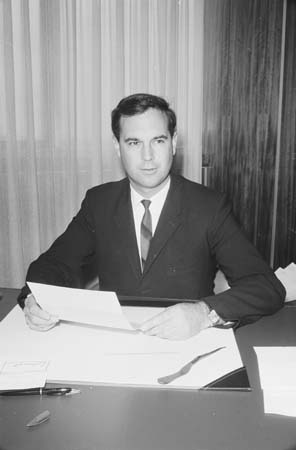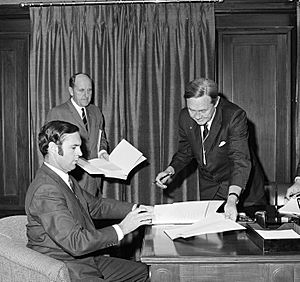Steele Hall facts for kids
Quick facts for kids
Steele Hall
|
|
|---|---|

Hall in 1968
|
|
| 36th Premier of South Australia | |
| In office 17 April 1968 – 2 June 1970 |
|
| Monarch | Elizabeth II |
| Governor | Sir Edric Bastyan Sir James Harrison |
| Preceded by | Don Dunstan |
| Succeeded by | Don Dunstan |
| Member of the Australian Parliament for Boothby |
|
| In office 21 February 1981 – 29 January 1996 |
|
| Preceded by | John McLeay |
| Succeeded by | Andrew Southcott |
| Senator for South Australia | |
| In office 18 May 1974 – 16 November 1977 |
|
| Preceded by | Nancy Buttfield |
| Succeeded by | Janine Haines |
| Treasurer of South Australia | |
| In office 2 March 1970 – 2 June 1970 |
|
| Premier | Steele Hall |
| Preceded by | Glen Pearson |
| Succeeded by | Don Dunstan |
| Leader of the Opposition in South Australia | |
| In office 2 June 1970 – 15 March 1972 |
|
| Deputy | Glen Pearson Robin Millhouse |
| Preceded by | Don Dunstan |
| Succeeded by | Bruce Eastick |
| In office 13 July 1966 – 17 April 1968 |
|
| Preceded by | Sir Thomas Playford IV |
| Succeeded by | Don Dunstan |
| Leader of the Liberal and Country League | |
| In office 13 July 1966 – 15 March 1972 |
|
| Preceded by | Sir Thomas Playford IV |
| Succeeded by | Bruce Eastick |
| Member of the South Australian Parliament for Goyder |
|
| In office 10 March 1973 – 8 June 1974 |
|
| Preceded by | James Ferguson |
| Succeeded by | David Boundy |
| Member of the South Australian Parliament for Gouger |
|
| In office 7 March 1959 – 10 March 1973 |
|
| Preceded by | Rufus Goldney |
| Succeeded by | Keith Russack |
| Personal details | |
| Born |
Raymond Steele Hall
30 November 1928 Balaklava, South Australia, Australia |
| Died | 10 June 2024 (aged 95) |
| Political party | Liberal and Country League (1959–73) Liberal Movement (1973–76) Liberal Party of Australia (1976–96) |
| Spouses |
Anne Fletcher
(m. 1956; div. 1978)Joan Bullock
(m. 1978) |
Raymond Steele Hall (born 30 November 1928, died 10 June 2024) was an important Australian politician. He served as the 36th Premier of South Australia from 1968 to 1970. He also worked in the federal Parliament. He was a senator for South Australia from 1974 to 1977. Later, he was a federal member for the Division of Boothby from 1981 to 1996.
Hall was a state politician from 1959 to 1974. He led the Liberal and Country League party from 1966 to 1972. As Premier, he made big changes to how elections worked. He removed an old system called the Playmander. This system unfairly helped his party win elections. His changes led to his party losing the 1970 South Australian state election. In 1972, he started a new group called the Liberal Movement. He left his old party when this new group separated in 1973. He continued as a state politician until 1974. He then resigned to run for a Senate seat.
Hall won a Senate seat for the Liberal Movement in both the 1974 and 1975 elections. The Liberal Movement later joined back with the Liberal Party in 1976. Hall then resigned from the Senate in 1977. He tried to win a seat in the House of Representatives but was not successful. In 1981, he won the seat of Boothby in a special election. He stayed a Liberal member for Boothby until he retired in 1996.
Contents
Early Life and Beginnings
Steele Hall was born on 30 November 1928. His birthplace was Balaklava, South Australia. He grew up on his family's sheep and wheat farm. This farm was about 800 acres (320 hectares) in size. He went to primary school in Owen. After that, he finished high school at Balaklava High School.
Political Journey
State Politics in South Australia
Hall was first elected to the South Australian House of Assembly in 1959. He represented the area of Gouger. He quickly became known for his strong and independent opinions. He rose through the ranks of the Liberal and Country League party. In July 1966, he became the party leader. This happened after Premier Thomas Playford retired. Playford had been Premier for 26 years. He supported Hall as his replacement.
Hall was the Leader of the Opposition for two years. Then, he led his party into the 1968 election. He was seen as a young and modern leader. The election resulted in a "hung parliament." This means no single party won enough seats to form a government alone. Both Labor and the Liberal and Country League won 19 seats each. An independent politician, Tom Stott, decided to support Hall's party. Because of this, Hall became Premier on 17 April 1968.
Hall immediately focused on changing the election rules. For 40 years, the election boundaries were unfair. This system, called the Playmander, greatly helped the Liberal and Country League. For example, a vote in the city was worth less than a vote in the country. Hall felt it was wrong that his party could win government with fewer overall votes. He wanted a fairer system.
Hall introduced a new law to change elections. It increased the number of seats in the House of Assembly to 47. More seats were added for the Adelaide area. This made the system much fairer, even though country areas still had a bit more representation. Hall knew this change would likely help the Labor party win future elections. He believed it was the right thing to do for fairness.
Besides election reform, Hall also improved social welfare. He also worked on issues for Aboriginal people. In 1968, he started adding fluoridated water to South Australia's water supply.

Hall also served as his own Treasurer for two months in 1970. Hall and Tom Stott, the independent politician, disagreed about where to build a dam. Stott wanted the dam in his area, but Hall thought another location was better. This disagreement led to Stott voting against Hall's government. This forced an early election in June 1970. As expected, the Labor party won this election. They gained 27 seats to the Liberal and Country League's 20.
Hall remained the Leader of the Opposition for two years. On 15 March 1972, he left the Liberal and Country League. He said the party had "lost its idealism." He then started a new political group called the Liberal Movement. This group included about 200 former Liberal and Country League members. Hall and his new group helped the government introduce new voting rules. These rules gave all adults the right to vote for the Legislative Council of South Australia.
Before the 1973 state election, Hall's voting area changed. He ran as a Liberal Movement candidate for the new area of Goyder. He won this election.
Federal Politics in Australia
Hall won a federal Senate seat for the Liberal Movement in the 1974 election. He resigned from his state seat to do this. In the federal Parliament, Hall supported the government's new election laws. He used his experience as a Premier to explain why these changes were good. During a big political crisis in 1975, Hall voted against delaying important money bills. He did this even though he was against the government at the time.
Hall was re-elected in the 1975 election. In June 1976, he joined the Liberal Party. This happened after the Liberal Movement rejoined the main Liberal party. He resigned from the Senate on 16 November 1977. He tried to win a seat in the House of Representatives but was not successful.
After four years out of politics, Hall won a special election in 1981. He became the Liberal Party's candidate for the area of Boothby.
In August 1988, the opposition leader, John Howard, spoke about controlling Asian immigration to Australia. Steele Hall, along with two other politicians, disagreed strongly. They voted with the Labor government against using race to choose immigrants.
Steele Hall spoke in Parliament about this. He said that public opinion could easily be led on issues about race. He believed it was important to unite the community on race. He warned against it becoming an "ugly reproach for us all."
Hall held the seat of Boothby until he retired in 1996. He played a key role in choosing his successor. He made sure that Andrew Southcott was chosen to take his place.
Hall spent most of his time as a federal politician on the backbench. This means he was not a minister in the government.
Family Life and Passing
Steele Hall married Anne Fletcher, a schoolteacher, in 1956. They had one son and three daughters. They divorced in 1978. Later that year, he married Joan Bullock, who was his research assistant. They had one son and one daughter together. Joan Hall was also elected to the South Australian parliament in 1993.
Steele Hall passed away on 10 June 2024, at the age of 95.
See also
 In Spanish: Steele Hall para niños
In Spanish: Steele Hall para niños
 | James B. Knighten |
 | Azellia White |
 | Willa Brown |

